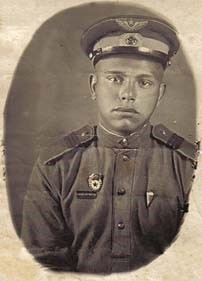
Matvei Likhterman
Matvei Likhterman was born in 1921 in the town of Shumiachi, western Russia, on the border with Belorussia. Soon after he was born, the family moved to nearby Roslavl, where Matvei graduated from school and worked at a factory. In March 1941 he was drafted into the Red Army. The motorized rifle regiment to which he was sent for military training was stationed in Uzbekistan, in Central Asia. Likhterman then began as a gunner of 45 mm canons.
In June 1941 the Soviet-German war began and the regiment was transferred from Central Asia to the frontlines. In July 1941, Likhterman took part in the Ielnia Operation – the liquidation of the Ielnia salient of the German Army in western Russia and the abortive counter-offensive of the Red Army. He referred to this battle with the quite comprehensible Soviet slang term as a great "meat grinder."[1] After three weeks of fighting, the gunner Likhterman was seriously wounded and sent to the rear military hospital. It was in the hospital that he encountered antisemitism.
"There was one incident that I still can not forget. The wards were large, with 40 wounded in each. A loudspeaker 'plate' hung on the wall. I could hear Levitan [the renowned Soviet wartime radio announcer and a Jew] speaking on the radio about German atrocities in the occupied territory. The point [he was stressing] was that the Germans tied the Jews to tanks, then the tanks moved in different directions and the bodies of the unfortunate victims were torn to pieces. Suddenly, many people were laughing and shouting from different parts the ward: "Well done, Germans, finishing the Yids off like that!" Everything inside me turned to stone. Until then I was an ardent patriot, even a fanatic one, but now ... I was lying there and wondering how I could fight side by side with such people [who approved of what the Germans were doing], wondering whether they were human beings at all?"
The treatment of Likhterman's injury dragged on until March 1942, when he was declared unfit for the military service. However, four months later, the military authorities reversed their decision and Likhterman declared fit to serve. This time he was sent to a military technical school that prepared technicians for anti-aircraft defense. A short time before graduation, seventeen cadets of this school, including Likhterman, were selected. They were given the rank of sergeant (rather than the expected one of lieutenant) and were assigned to the 3rd Airborne Landing Brigade, which was being formed at this time. Likhterman then completed a course to prepare soldiers to parachute and carry out sabotage in the enemy rear.
In September 1943 Likhterman took part in the ill prepared Dnieper (or Bukrin) Landing of the Red Army, which ended in tragedy with thousands of Soviet soldiers killed in vain. A few days after the landing in the enemy rear, the remnants of his battalion were encircled by the Germans. The last eleven men of the battalion were captured. One of his comrades immediately betrayed Likhterman as a Jew. Only the reigning chaos (during which the Germans transferred the POWs from place to place) saved his life. He understood that he had to mix in with POWs who did not know him personally since he constantly risked being revealed as a Jew. The following is how he related his experience:
"A collaborator-policeman came up to me and said: 'It is interesting how much you look like Kaganovich [a Soviet leader of Jewish origin].' I responded: 'And you look very much like Lenin.' He hit me but then continued on his way."[2]
When the Red Army approached the POW camp, the Germans took the POWs on a forced march westward. Likhterman realized that it was his last chance to escape. He succeeded in doing so when the column of the POWs was close to the border of Moldova. After much wandering eastward, Likhterman reunited with the Red Army. Numerous interrogations followed because Red Army "special departments" and SMERSH [the Soviet anti-espionage institution] did not believe that a Jew could have survived a Nazi camp. After having survived many "screenings," Likhterman realized that he had to join some newly formed unit where nobody knew him personally. Such an opportunity presented itself and he joined the 107th Rifle Division as a radio operator, fighting with the division in Poland and Czechoslovakia. He ended the war in the mountains of Bohemia.
In 1990 Matvei Likhterman moved to Israel, where he settled in Jerusalem.






